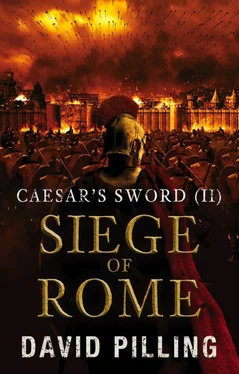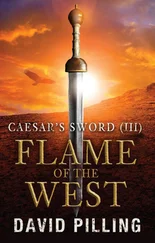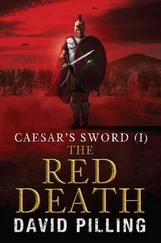David Pilling - Siege of Rome
Здесь есть возможность читать онлайн «David Pilling - Siege of Rome» весь текст электронной книги совершенно бесплатно (целиком полную версию без сокращений). В некоторых случаях можно слушать аудио, скачать через торрент в формате fb2 и присутствует краткое содержание. Год выпуска: 2013, Жанр: Исторические приключения, на английском языке. Описание произведения, (предисловие) а так же отзывы посетителей доступны на портале библиотеки ЛибКат.
- Название:Siege of Rome
- Автор:
- Жанр:
- Год:2013
- ISBN:нет данных
- Рейтинг книги:3 / 5. Голосов: 1
-
Избранное:Добавить в избранное
- Отзывы:
-
Ваша оценка:
- 60
- 1
- 2
- 3
- 4
- 5
Siege of Rome: краткое содержание, описание и аннотация
Предлагаем к чтению аннотацию, описание, краткое содержание или предисловие (зависит от того, что написал сам автор книги «Siege of Rome»). Если вы не нашли необходимую информацию о книге — напишите в комментариях, мы постараемся отыскать её.
Siege of Rome — читать онлайн бесплатно полную книгу (весь текст) целиком
Ниже представлен текст книги, разбитый по страницам. Система сохранения места последней прочитанной страницы, позволяет с удобством читать онлайн бесплатно книгу «Siege of Rome», без необходимости каждый раз заново искать на чём Вы остановились. Поставьте закладку, и сможете в любой момент перейти на страницу, на которой закончили чтение.
Интервал:
Закладка:
In truth, I doubt Belisarius had set his heart on winning that battle. The Goths were too many, and he had only consented to fight in order to prevent a mutiny among the officers and senators. He was handed a stark choice of sacrificing the lives of his men in order to please their vanity, or refusing their demands and risking a full-scale revolt.
His leadership and authority were on a knife-edge at all times, just one wrong decision removed from catastrophe. Such had the ancient Roman virtues of discipline and respect for higher authority fallen away in these degenerate latter days.
I was privileged, if that is the word, to observe a battle from afar rather than risking my neck in the midst of one.
All went well for a time. Our Hunnish and Sclavonian horse-archers skillfully charged and retreated, avoiding contact with the superior numbers of Gothic lancers and spearmen and showering them with arrows. Despite their appalling losses, the Goths held their line and refused to advance. They had learned to be wary of Belisarius, and feared moving forward in case they fell into some clever ambush.
There was no ambush. Belisarius’ one aim was to kill as many Goths as possible before ordering a general advance. Sweat clouded my eyes and rolled down my back, already boiling inside layers of leather and mail, as I imagined our meagre squadrons being ordered forward to engage that great mass of barbarians.
If we marched onto the open plain, away from the protection of the ditch and our archers on the walls, the Gothic cavalry could easily encircle our flanks and rear, while their infantry engaged us head-on. We risked being swamped, trapped and crushed inside the closing steel jaws of the enemy.
For hours the fight raged back and forth, while the sun slowly dipped in the sky and I silently pleaded for Belisarius to change his mind and order a withdrawal.
I witnessed some extraordinary sights during the course of the fighting. Cutilas, the Thracian officer whom Belisarius had entrusted with part of the cavalry, plunged alone into the midst of a howling band of Gothic lancers, and was struck in the head by a javelin. He cut his way out, felling Goths like ripe wheat, and rode back to our lines with the javelin still embedded in his skull, waving back and forth like some bizarre appendage. Our physicians later managed to extract it, but the wound turned bad and he died a few days later.
Another man named Arzes, one of Belisarius’ Guards and a slight acquaintance of mine, also suffered a terrible wound. His men rescued him from the press, threw him over the back of a horse and escorted him back to the city for medical attention.
Our ranks parted to let them through, and I whistled between my teeth when I saw the Gothic arrow imbedded between his nose and right eye. An unusually skilled physician later managed to draw the arrow out and save Arzes’s eye, by making an incision at the back of his neck and ripping the triple-pronged barb out through the hole. A grisly procedure, and one I was glad not to witness.
On the western side of the city, beyond my sight and hearing, our troops under Valerian and Martinus initially performed wonders. Their cavalry fell on the Gothic camps and threw them into confusion, slaughtering hundreds of their warriors and retreating in good order when reinforcements came storming up. Meantime the Roman citizen levies and their Moorish auxiliaries stayed quiet and motionless in the rear, where they could be most effective simply by looking formidable.
Procopius witnessed the battle on the Plains of Nero from the safety of the walls, and later that evening gave me a full account of the disaster that ensued.
“You may blame the Romans,” he said, “for acting like fools instead of cowards. I think I preferred the latter. Seeing the Goths west of the river being thrown into disorder and routed by our cavalry, they abandoned all notions of discipline and poured forward, ignoring the shouts of their captains.”
He paused to take a sip of wine and stare bleakly into our camp-fire. “Like all soldiers with the minimum of training, they forgot about the enemy and started to plunder the camps. The Goths, under Vitiges, rallied and counter-attacked. Our cavalry tried to stop them, but were engulfed and smashed to pieces. You should have seen Vitiges, Coel. He was like some pagan god of war, huge and terrible in his winged helm, his eyes flashing fire and brimstone. His sword was lightning in his hand, striking one man down after the other – stab-stab-stab! Alaric himself could have scarcely looked more terrible.”
“If you have finished glorifying the enemy, what happened then?” I asked impatiently. Some of my Isaurians were seated in a circle around the fire and leaning forward intently, open-mouthed and wide-eyed, to catch his words. They loved stories, and Procopius loved an audience, so the two were well suited.
“The Romans broke and fled,” he said with a shrug, slightly nettled by my directness, “and were pursued all the way back to Rome. Hundreds died before they reached the safety of the gates. There will be a great many widows and orphans weeping over their lost menfolk tonight. Our surviving cavalry would have been destroyed to a man, if not for the arrival of Bochas.”
Bochas was one of the officers Belisarius had placed in command of his cavalry. When news of the unfolding disaster in the Plains of Nero reached the general, he had recalled as many men as he could from the fighting beside the Tiber and sent them to relieve Valerius and Martinus.
The collapse of our army on the Plains of Nero, precipitated by the ill-timed charge of the Romans, occurred at the same time as Belisarius’ attack to the north started to falter. The Goths had poured more men into the battle, replacing their earlier losses, and after hours of fighting our cavalry were tiring and running short of arrows.
Belisarius was not fool enough, thank God, to commit his infantry to try and rescue the situation. We remained at our posts, watching our horse-archers fight with the utmost skill and bravery. Time and again, they charged into endless clouds of arrows, before wheeling, retreating, splitting up and reforming for another assault.
The Goths bided their time. When the sun hovered low on the horizon, and the reeking plain was bathed in red-gold light, the droning of their horns swept the field. This was the signal for fresh squadrons of Gothic and Frankish cavalry, held in reserve until now, to burst from the depleted lines of their infantry and charge our exhausted horsemen.
“Form line!” The order passed through our ranks and was taken up by each officer in turn, myself included.
The ground shook underfoot as my Isaurians formed into two lines of fifty, the last man on each flank almost rubbing shoulders with the men of the next squadron. They may have been a sullen and recalcitrant lot, but they knew their trade, and shuffled calmly into position.
As they were drilled, the front rank stood with their large round shields forming an interlocking wall, spears presented horizontally at chest height. Behind them the men of the rear rank stood with spears held upright, ready to step forward and fill any gaps in the line if we suffered casualties.
I stood behind them, just to the left of the rearmost man on the end of the line, watching in horror as the broken remains of our cavalry fled back towards the city. The Goths pursued relentlessly, spearing and chopping down the fugitives. In a moment, a few short seconds, the barbarian tide would roll over us.
“Ready!”
The order came from our captains of foot-archers. Again these were mostly Isaurians, formed up behind the lines of spearmen. A tremor passed through our army, accompanied by audible moans of fear, but the presence of the general steadied us.
Читать дальшеИнтервал:
Закладка:
Похожие книги на «Siege of Rome»
Представляем Вашему вниманию похожие книги на «Siege of Rome» списком для выбора. Мы отобрали схожую по названию и смыслу литературу в надежде предоставить читателям больше вариантов отыскать новые, интересные, ещё непрочитанные произведения.
Обсуждение, отзывы о книге «Siege of Rome» и просто собственные мнения читателей. Оставьте ваши комментарии, напишите, что Вы думаете о произведении, его смысле или главных героях. Укажите что конкретно понравилось, а что нет, и почему Вы так считаете.












